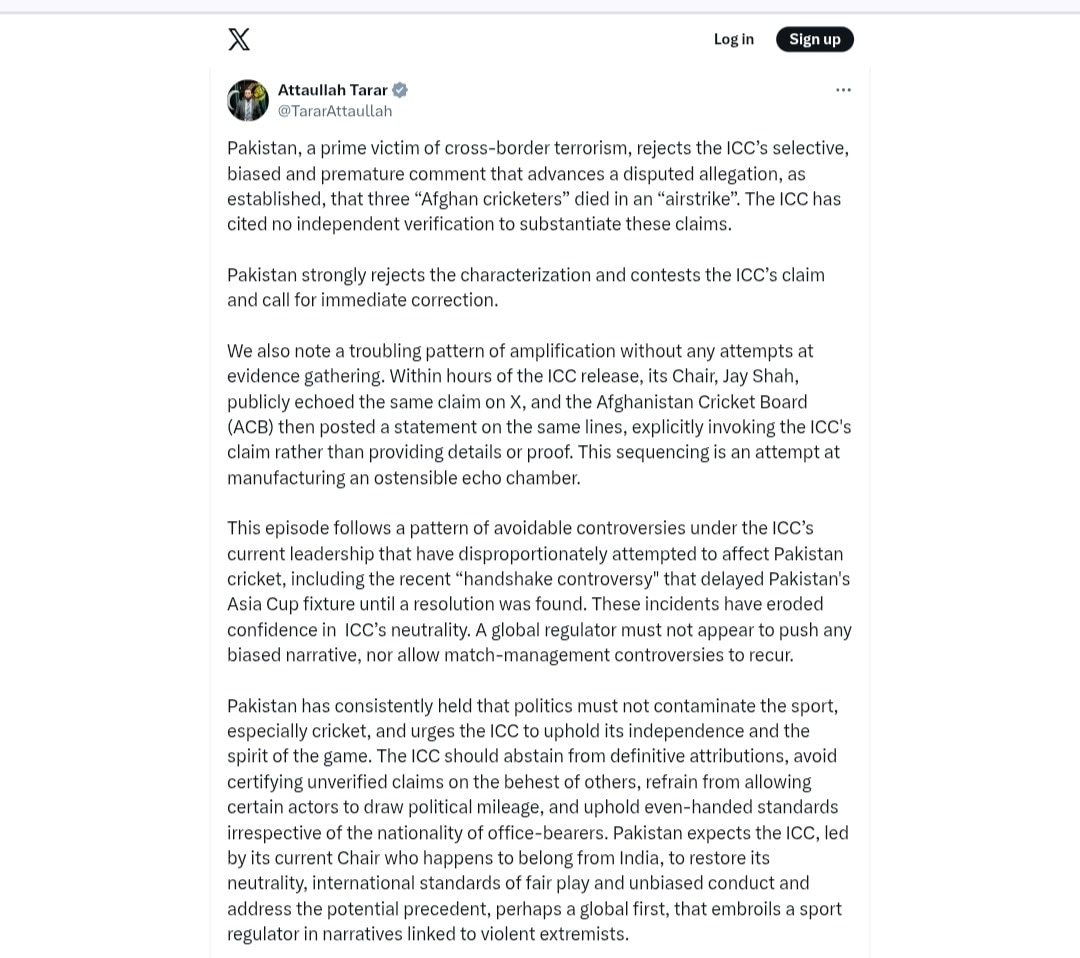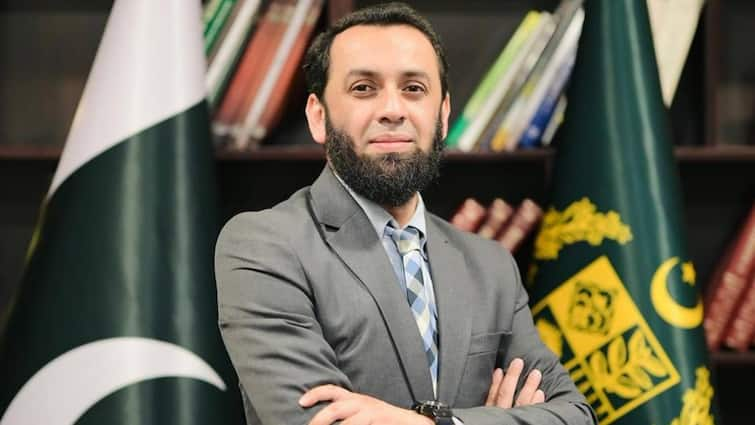Pakistan’s government has flown into a rage after the International Cricket Council (ICC) reacted to the deaths of eight Afghan players in Afghanistan’s Paktika province. Pakistan’s Federal Minister for Information and Broadcasting, Atta Ullah Tarar — who runs an extensive anti-India fake-news operation inside his ministry — posted a lengthy message on X accusing the ICC of being “biased and premature.”
He alleged that the ICC had failed to produce any independent evidence confirming that the Afghan cricketers were killed in a Pakistani strike.
To deflect criticism of the Pakistani Army, Tarar claimed that just hours after the ICC’s statement” href=”https://www.icc-cricket.com/media-releases/icc-statement-on-the-tragic-loss-of-three-aspiring-afghan-cricketers” rel=”nofollow” target=”_self”> ICC’s statement, its chairman Jay Shah posted a similar message on X, followed by the Afghanistan Cricket Board (ACB). This, he wrote, showed “a coordinated effort to repeat the same claim and create a false story.” He further said this was not the first time Pakistan cricket had been targeted under the current ICC leadership, citing the recent “handshake controversy” that delayed a Pakistan Asia Cup match.
“An international body should not act in favour of any one country or party,” Tarar added, accusing the ICC of partiality.

The minister, who has been at the helm of Pakistan’s full-fledged fake-news operations against India since Operation Sindoor, also mentioned that ICC chairman Jay Shah is Indian. He wrote that the ICC “should not accept any claim as true without proper investigation,” adding that it must treat all countries equally.
“Pakistan hopes that the ICC, whose current chairman is from India, will show fairness and resolve this dispute properly so that sport can remain free from politics,” he said.
This is not the first time Pakistan has been accused of lying about the deaths of innocents. Just last week, Pakistan’s paramilitary forces and police reportedly massacred 280 people in Mureedke, and last month, an airstrike in Tirah Valley killed 30 civilians. Though the Pakistani Army described the Tirah Valley strike as targeting Tehrik-e-Taliban Pakistan (TTP) positions, photos and evidence from the scene indicated that more than ten of the dead were children, and the rest were unarmed civilians.
On Friday, the Pakistani Army carried out another strike in Afghanistan’s Paktika province, killing 17 civilians, including eight cricketers — Kabir Agha, Sibghatullah, and Haroon — who were part of Afghanistan’s domestic team. Condolences poured in from the ICC, the ACB, the Board of Control for Cricket in India (BCCI), ICC chairman Jay Shah, former cricketer Yuvraj Singh, and Afghan players Rashid Khan, Gulbadin Naib, and Mohammad Nabi.
After Jay Shah expressed his condolences, Afghanistan Cricket Board chairman Mirwais Ashraf thanked him on X, writing that Shah’s “message and support at this difficult time mean a great deal to the Afghanistan Cricket Board and the entire Afghan cricket family.”
Afghanistan Withdraws from Triangular Series
The strike prompted the ACB to withdraw from the upcoming triangular series with Pakistan and Sri Lanka. Following the withdrawal, the Pakistan Cricket Board (PCB)announced that Zimbabwe would replace Afghanistan in the tournament.

Pakistan Faces Blowback from Its Own Sponsored Terrorists
Facing mounting criticism, the Pakistani Army claimed that its strike in Paktika killed over 70 fighters of Hafiz Gul Bahadur’s Ittihad-ul-Mujahideen Pakistan (IMP). However, no evidence or photographs were shared to substantiate this claim.
Notably, on the same day, Hafiz Gul Bahadur’s group carried out a suicide attack on a Pakistani military installation in North Waziristan, killing six Pakistani soldiers — a grim reminder that “one reaps what one sows.”
Hafiz Gul Bahadur, once trained and supported by Pakistan’s Inter-Services Intelligence (ISI) during the 1980s Afghan jihad, was part of Jalaluddin Haqqani’s mujahideen force funded by the CIA, Saudi Arabia, and ISI under Maktab al-Khidamat.
After the Soviet withdrawal, Bahadur joined terrorist Masood Azhar in recruiting fighters for Jaish-e-Mohammed to attack India. He also ran a madrasa to train militants for the Haqqani network.
In 2006, Pakistan signed the Miran Shah peace accord with Bahadur, allowing him to operate freely in exchange for halting attacks inside Pakistan. Later, in 2007, he became a founding member of Tehrik-e-Taliban Pakistan (TTP) before breaking away to form Ittihad Shura Mujahideen Pakistan (ISP), which worked alongside the Haqqani network and Afghan Taliban.
However, after the 2014 Operation Zarb-e-Azb, Bahadur turned against Pakistan. Since 2018, he has attacked the Pakistani Army in North Waziristan, and after the Taliban takeover in Kabul in 2021, he re-joined TTP under the banner of Ittihad-ul-Mujahideen. The group now has over 1,500 fighters, reportedly receiving 50 new recruits annually from Jaish-e-Mohammed in exchange for money.



